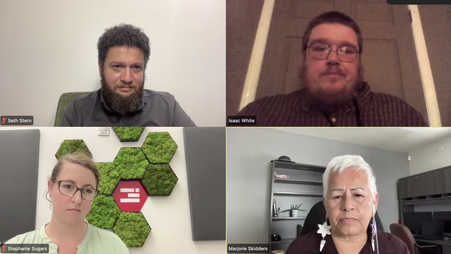We’ve all probably had this experience at some point: a news story discusses a government document the reporter has managed to obtain and that we’d like to read as well. But, after scouring the article for a link to said document, it becomes clear that it’s not there.
This used to be a minor annoyance. Why not let people see public source material for themselves? No matter how thorough journalists may be, they often don’t have room to tell us all the document might. Plus, as law professor Sarah Fackrell noted, reporters might miss something about a court filing a lawyer would pick up on, something about a public health document a doctor might catch, and so on.
But the stakes are higher now, as government websites and records disappear, agencies are haphazardly folded, lawless oligarchs shield their shady quasi-governmental operations from view, and the future of the National Archives is uncertain.
It’s on all of us to preserve the public domain. Everyone should be getting into the habit of archiving any government record they access online so it’s not lost. But the press should help lead the charge. Or, at the very least, when they obtain government documents, they should let news readers share the wealth.
That means news stories should include links to public documents (hosted somewhere other than government sites from which they might disappear). It also means not paywalling them.
Ideally, we’d like to see news outlets not paywall any government records-based reporting (if a small independent outlet like 404 Media can do it, others can too). It’s a problem that misinformation is free and real news isn’t. But if that’s not economically feasible, at least let people access the records themselves for free. They’re public records, after all.
News isn’t just any business, it’s a constitutionally protected public service. And the moment calls for the Fourth Estate to do whatever it can to preserve transparency.
News outlets could even take it a step further: proactively post all newsworthy public records they find during their reporting, whether online, through the Freedom of Information Act, or otherwise. We’re not asking them to forfeit scoops: They can wait till they’ve either reported on the records or decided they’re not going to anytime soon.
We get it: News outlets expend significant resources in pursuit of government records, sometimes litigating FOIA cases for years before finally getting what they’re after. Why should people get to piggyback off those efforts for free?
Well, because news isn’t just any business, it’s a constitutionally protected public service. And the moment calls for the Fourth Estate to do whatever it can to preserve transparency.
But beyond that, what’s to say that sharing public records is bad for business? What’s more likely to entice someone to subscribe: brief previews of articles that offer no assurance that the rest is worth reading, let alone paying for? Or the clearly newsworthy — but often dense — records the articles explain?
Most people don’t want to read, synthesize, and contextualize public records themselves — they rely on journalists for that. If journalists show them what records they’re digging up, they might gain respect for the work reporters do and want to know what they have to say about them.
Over the next few years, a lot of people and industries will have to put aside assumptions and norms from a bygone era and do what’s needed to preserve American democracy (or at least a record of what once was). Sharing public records with the public is one low-cost, low-risk strategy for journalists to do their part. Who knows, it might even be profitable.





